Buckwheat and Hazelnut Pancakes
I think I just found out the reason why I don’t normally post breakfast recipes in here. I love breakfast and, in fact, mornings are the time of the day when I feel the most hungry. However, shooting breakfast foods is, for me, a bit painful because that means I have to hold back my hunger and only eat after I’ve taken pictures of said foods (which can take a while).
After waking up and drinking a few glasses of water, I go into the kitchen and, usually, cook myself a big bowl of porridge. When I’m feeling lazy, granola with almond milk will do. I like routine and I’m pretty good at sticking to it, so my breakfast doesn’t vary much. Actually, and that might come as shock to some of you, I only tasted pancakes a few years ago, when this book came out and I tried its recipe (which I highly recommend) for the well known breakfast treat. This time around, though, I decided to create a pancake recipe following my own instinct. I’m not quite sure that was a good idea: my early attempts didn’t come out well, so I kept trying through the whole last week and ended up eating pancakes for breakfast for the most part of it.
There’s no actual science behind making pancakes and you can definitely adjust the process a bit to your own liking. There are people who prefer theirs fairly thick, while others might like them more on the thinner side. I fit into the former category. For this recipe, and in order for the pancakes to have a good height, I used a metal ring so that the batter didn’t spread to the sides. This is, of course, an optional extra step. For serving, I topped mine with a raspberry-date compote I’ve made early last week, but they do taste heavenly with just a good drizzle of maple syrup on top.
Buckwheat and Hazelnut Pancakes
(makes 4 to 8 pancakes, depending on their size)
50 g / 1/2 cup hazelnut meal
120 g / 3/4 cup buckwheat flour
2 teaspoons baking powder
1/4 teaspoon salt
1 tablespoon coconut sugar
310 ml / 1 1/4 cups oat milk (or any other dairy-free milk)
melted coconut oil for greasing the skillet
Add all the ingredients (except the oat milk) to a bowl and mix well. Slowly pour in the oat milk and whisk to combine. You’ll get a fairly thick batter, which is what you’re looking for.
Using a pastry brush, grease a large non-stick skillet with the melted coconut oil. Turn the heat to medium and, when the pan is hot, drop for each pancake 3 to 4 tablespoons of the batter. Cook the pancake for 2 to 3 minutes or until its top has just started to set. With a spatula, turn it over and cook for one additional minute.
Repeat the process with the remaining batter. Make sure you grease the pan with additional coconut oil each time you drop the batter into the skillet. Serve the pancakes with agave nectar or maple syrup or, as shown above, with a raspberry-date compote and banana slices.
Upside-down Pear Cake
When I first started this blog I promised myself I’d be posting a recipe at least once a week. Back then, I was so excited about this whole blogging thing that I found myselft posting two, three, recipes a week. But school work has been leaving me with very little time to cook these days, and that’s the main reason why I can’t keep with my former promise all the time. Anyway, today, after an almost 12 hour sleep (yes, that’s possible), I cured my tiredness from the very busy week I had, and sit in front of the computer after lunch - this time, not to work on the projects I have on hand, but to write you the recipe for a delicious upside-down pear cake.
As I’ve told you in the previous post, I’ve been working with gluten-free flours recently and the results couldn’t be better. So, this cake not only is gluten-free but delicious on its own. Chickpea flour is here used in place of eggs and the pairing of buckwheat with fall fruits such as pears, seems to work extremely well. As we’re approaching Christmas, and I’m experimenting with a couple ingredients typicall for this time of the year, it’s more likely that the following recipes will be desserts, cakes, and hearty savory dishes - we’ll then have plenty of time in January to get back on track. ; )
Upside down Pear Cake
(one 23 cm cake, 6 to 8 slices)
for the fruit layer:
3 medium-sized pears, ripe but firm, cored and sliced
3 tablespoons muscavado sugar
3 tablespoons vegan margarine
a pinch of cinnamoon
for the cake layer:
140 grams (1 cup) buckwheat flour
130 grams (1 cup) white rice flour
1 teaspoon powdered ginger
1 teaspoon ground cinnamon
¼ teaspoon salt
2 teaspoons baking powder
5 tablespoons melted vegan margarine
100 grams unsweetened soy youghurt
45 grams gram flour
60 ml (¼ cup) plus 3 tablespoons water
160 ml (2/3 cups) soy milk
120 grams muscavado sugar
80 ml (1/3 cup) agave nectar
1. Pre-heat the oven to 180ºC. Oil a 23 cm round baking pan.
2. Heat a large skilllet over medium heat. Add 3 tablespoons of vegan margarine, pears, sugar, and cinnamon, and cook, covered, for 5 to 10 minutes, or until the pears are tender and slightly caramelized. Let the cooked pears cool to room temperature. Transfer the pears and their syrup to the prepared pan, spreading evenly.
3. In a large bowl, combine the buckwheat and white rice flours, powdered ginger, ground cinnamon, salt and baking powder.
4. In another large bowl, whisk the melted vegan margarine and sugar. Add the yoghurt, soy milk, and agave nectar to the mixture, stirring to combine.
5. In a medium-sized bowl, add the gram flour and water, whisking everything until you get a smooth consistency. Slowly pour this mixture over the wet mixture and combine well.
6. Using a rubber spatula, fold the wet mixture into the dry mixture, being careful not to overmix.
7. Pour the batter into the prepared pan – over the pears - and bake for 40 to 45 minutes, or until a toothpick inserted in the center of the cake comes out clean.
8. Cool the cake in the pan for 20 minutes before inverting onto a large plate.
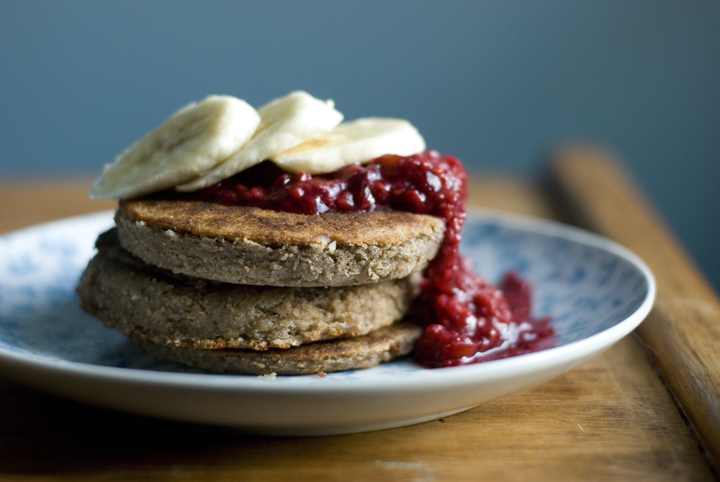
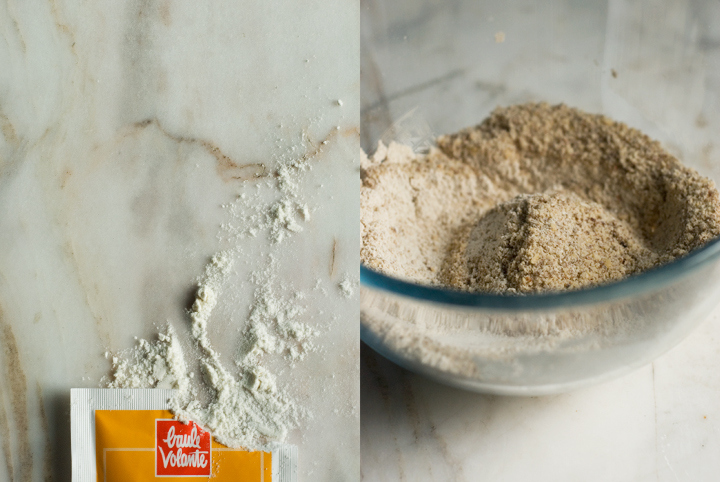
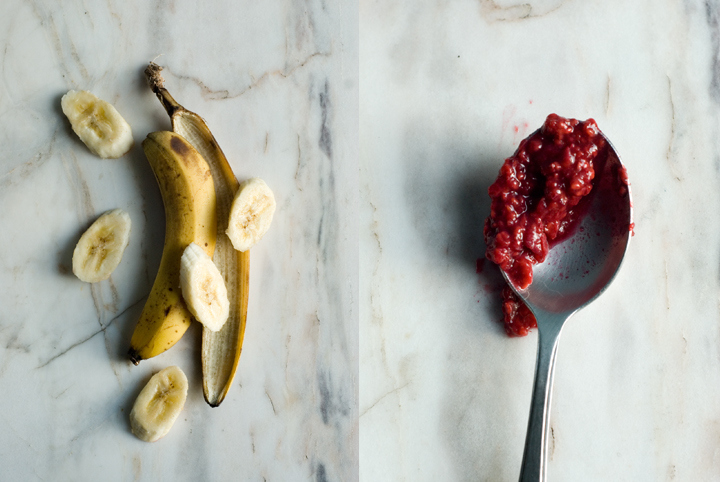
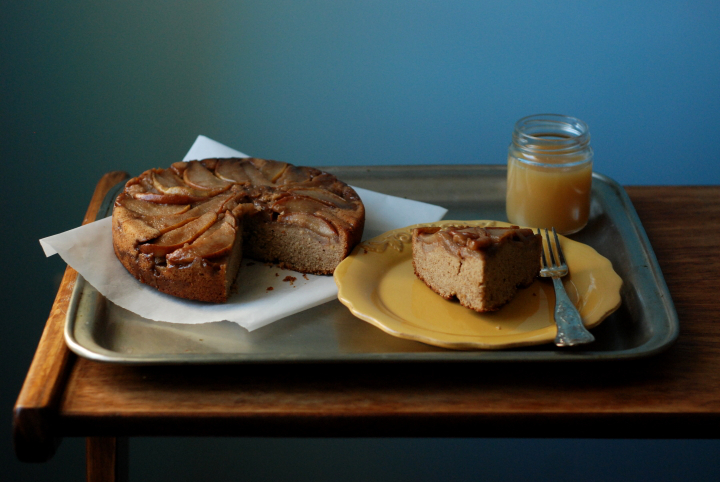
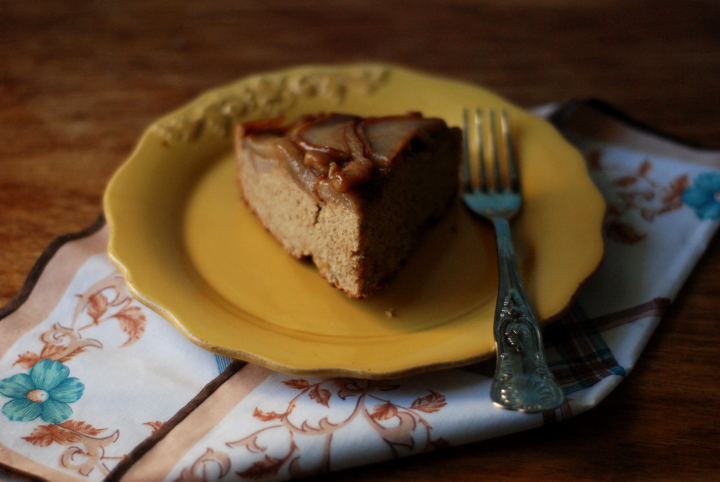
12 comments